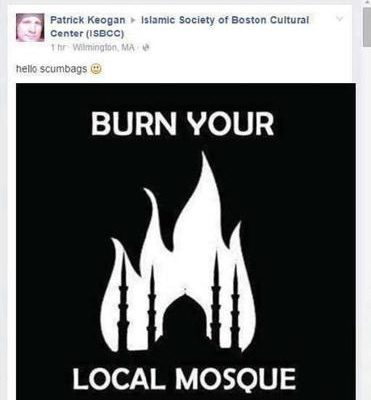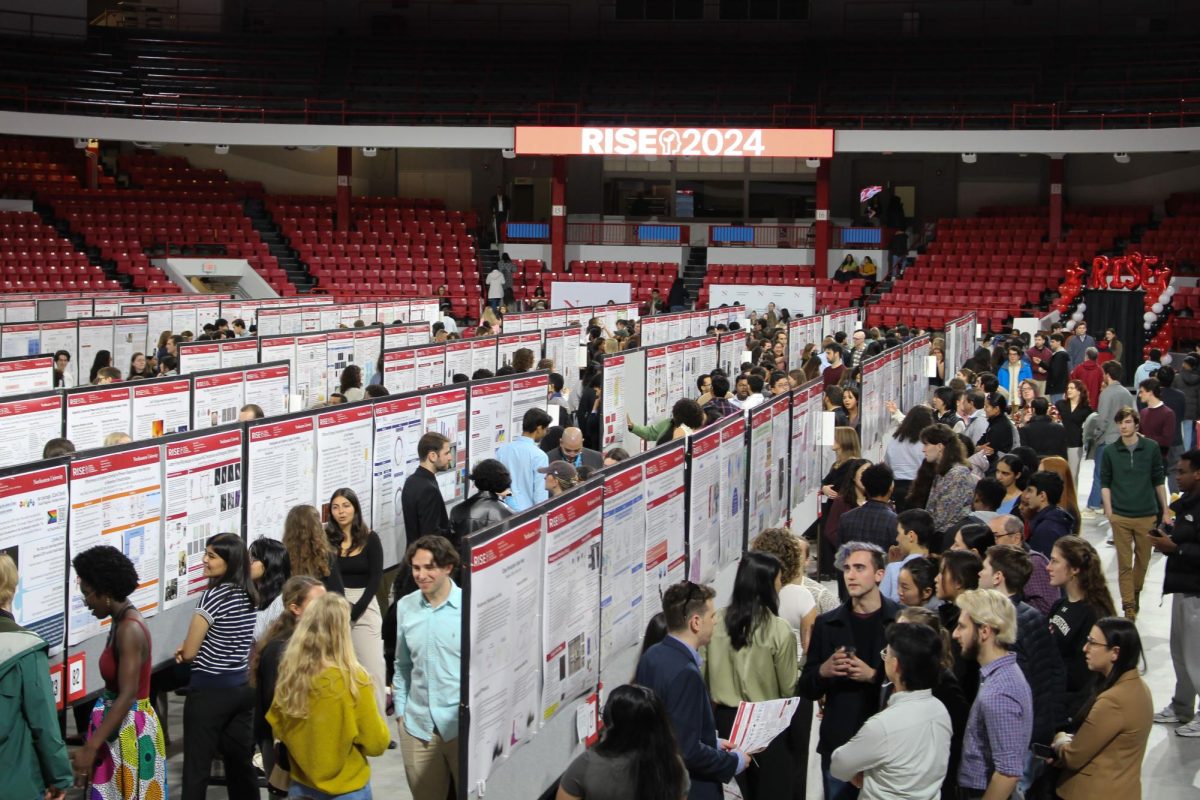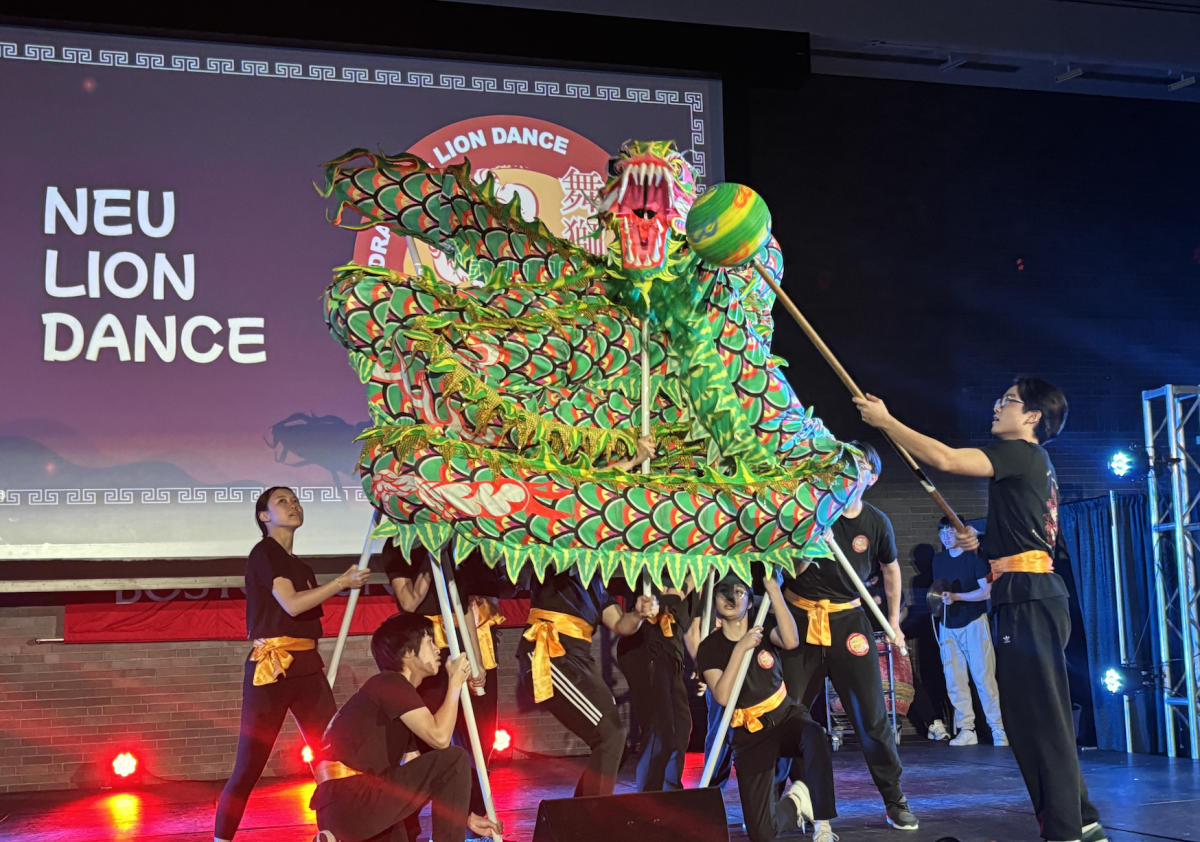By Rachel Morford, news corespondent
Wilmington, Mass. resident Patrick Keogan, 44, was arrested last week for allegedly making a series of social media threats against the Boston Muslim community and purchasing enough ammunition to burn Boston’s largest mosque to the ground.
According to the Boston Globe, charging documents state that the posts in question contained an image depicting “a mosque in flames with lettering superimposed that stated ‘Burn your local mosque.’” Alongside the image was a statement from Keogan reading “Hello scumbags” followed by a smiley face emoji. This threat was posted to the Facebook pages of both the Islamic Society of Boston Cultural Center and the Islamic Society of Northeastern University (ISNU).
Third-year political science major Sadiya Gurhan, who also serves as ISNU’s social justice chair, said that the purchase of firearms made the Keogan case particularly alarming.
“You get used to people shouting at you to go back to your country, or calling you a terrorist, but when someone buys guns and says they’re going to destroy your mosque? That’s a whole new level of scary,” said Gurhan.
Still, Gurhan said that the recent wave of hostility toward Muslims in the wake of worldwide terror attacks have made online threats a common occurrence.
“The rhetoric and discourse around Muslims has made us into enemies, allowing for these kinds of threats, so it’s not really surprising that people would do such things,” Gurhan said.
Other ISNU members said they felt similarly desensitized.
“It was a little disturbing, but not all that much,” said Osmaan Shahid, rising third-year biomedical physics major and ISNU co-president. “The thing is, you hear about this kind of incident all the time, and after a while you just get desensitized to it.”
Shahid explained that ISNU members are accustomed to hostile social media posts because of their frequency.
“It’s not really anything new, getting comments like that on the Facebook page,” Shahid said. “I have seen posts like that there a couple of times and usually we just ignore it.”
FBI Investigators arrested Keogan after monitoring his social media accounts and GPS record, which revealed that he had recently traveled to New Hampshire to purchase assault weapons and ammunition, according to a July 26 Boston Globe article.
Keogan’s arrest is the culmination of a three-year investigation. The FBI has been investigating his online activity since 2013, after he publicly expressed support of an individual who set an Islamic center in Missouri on fire. He called the perpetrator an “unsung hero” and “a true God amongst mortal men,” according to the Boston Globe. According to the Southern Poverty Law Center, court documents describe a series of vanity names attached to Keogan’s account, ranging from “Patrick CyberBully Keogan,” to the more violent “Patrick KillsMuslims Keogan.”
Shahid said he used to consider social media a tool to relieve anxiety, but hateful posts like Keogan’s have changed that.
“Now I go to Facebook if I want to get stressed,” Shahid said. “I was talking to my friend and she pointed out something really important. People can say whatever they want when they’re not held responsible for it…when you’re behind a computer screen, nobody is going to come after you.”
Although Keogan posted the image directly to the ISNU Facebook page, most members said that they did not feel specifically threatened.
“I have learned by now that people have their own perception, and there is nothing you can do to change that,” said rising third-year political science major and former ISNU event organizer Sabrina Khan. “His intention was not to target ISNU, but to target the Muslim community as a whole.”
Khan continued to express her larger concern that the incident is part of a disturbing trend.
“The overall perception of Muslims is starting to startle me,” she said. “The country is slowly starting to turn against a peaceful religion, and it isn’t fair. Over the past couple of years I feel like the country is going in the wrong direction when it comes to bigotry, especially because some high level officials are the ones encouraging it.”
Gurhan said that bigotry should not just be stopped when it threatens to incite violence.
“It’s not just the person trying to kill you that’s a problem…there’s also the day-to-day microaggressions and harassment,” said Gurhan. “And as a black woman I feel [bigotry] all the more prominently. Politicians and law enforcement could do better in this regard by seeing hate crimes as actual crimes and responding in a complete manner.”
Still, ISNU members including Shahid expressed immense gratitude for the welcoming environment Northeastern has been able to provide.
“I feel extremely safe on campus,” said Shahid, who also serves as secretary on the Northeastern University Interfaith Council. “And of course there are entire departments, like the Center for Spirituality, Dialogue and Service where it is just a safe place to be in. I don’t have to be afraid to be Muslim there. I don’t have to be afraid to be Muslim just on campus.”
Gurhan said that although she generally feels safe on campus, the next step to attaining a risk-free environment is to encourage an open dialogue.
“We need to change the language surrounding our discussion of Muslims and also our perceptions of Muslims,” she said. “To not vilify us, but to see us as actual people. See us as Americans. It’s a terrible injustice if you can’t even feel safe in your own country.”
Photo courtesy Boston Globe


















